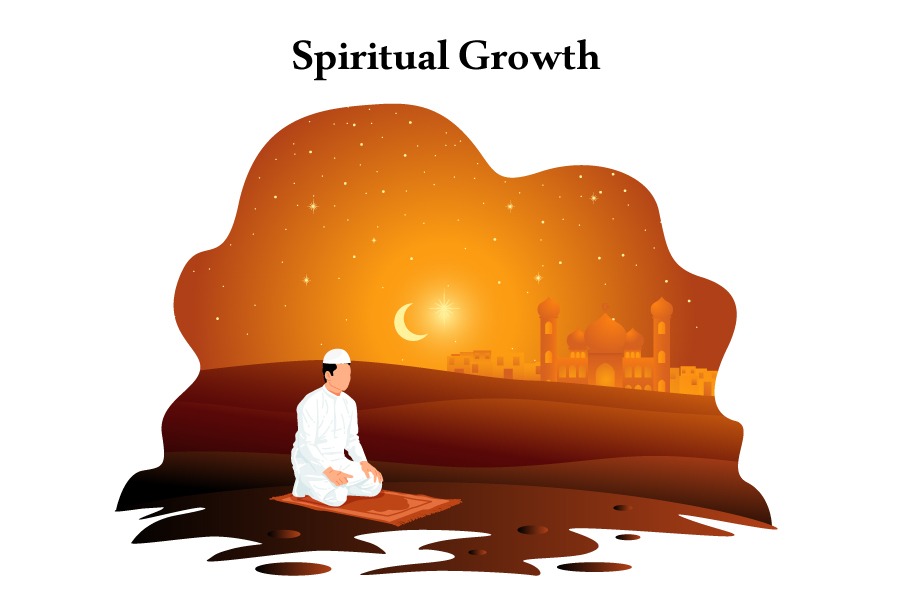In Islam, spiritual growth is an essential journey that every believer embarks on to strengthen their connection with Allah (God). It involves seeking closeness to the Divine, cultivating a deep understanding of the faith, and striving to embody its principles in everyday life. This article explores the concept of spiritual growth in Islam, highlighting its significance, key elements, and practical steps that can be taken to nurture one’s spirituality.
Understanding the Concept of Spiritual Growth in Islam
Spiritual growth refers to the process of developing and expanding one’s inner self, consciousness, and connection with the spiritual or transcendent aspects of life. It is a journey of self-discovery, self-awareness, and personal transformation that goes beyond the material and mundane aspects of existence. Spiritual growth can be pursued within the context of various belief systems, religions, or philosophical frameworks, or it can be a more individualistic exploration without necessarily adhering to a specific tradition.
In Islam, spiritual growth refers to the process of developing a deeper connection with Allah (God) and striving to attain a higher level of piety, devotion, and closeness to the Divine. It is about nurturing the soul, purifying the heart, and aligning one’s actions and intentions with the teachings and principles of Islam.
Key Elements of Spiritual Growth in Islam
-
Worship and Prayer
Regularly performing the five daily prayers (Salah) and engaging in other acts of worship, such as reciting the Quran, seeking forgiveness through repentance, and making du’a (supplication) to strengthen one’s relationship with Allah.
وَمَا خَلَقْتُ ٱلْجِنَّ وَٱلْإِنسَ إِلَّا لِيَعْبُدُونِ
“And I (Allah) created not the jinn and mankind except that they should worship Me (Alone).” [Az-Zariyat 51:56]
-
Tawheed (Monotheism)
Emphasizing and affirming the belief in the oneness of Allah and recognizing His absolute authority and presence in all aspects of life. In the third last surah of the Quran, Allah states,
قُلْ هُوَ ٱللَّهُ أَحَدٌ
Say, “He is Allāh, [who is] One,
ٱللَّهُ ٱلصَّمَدُ
Allāh, the Self-sufficient
لَمْ يَلِدْ وَلَمْ يُولَدْ
He neither begets nor is born,
وَلَمْ يَكُن لَّهُۥ كُفُوًا أَحَدٌۢ
Nor is there to Him any equivalent.”
(AlQuran 112:1-4)
-
Taqwa (God-consciousness)
Taqwa is the state of being conscious of God’s presence and His commandments. It involves a deep sense of reverence and piety. Cultivating a sense of mindfulness and awareness of Allah’s presence, leading to increased self-control and righteousness.
Allah says:
إِنَّ أَكْرَمَكُمْ عِندَ ٱللَّهِ أَتْقَىٰكُمْ ۚ إِنَّ ٱللَّهَ عَلِيمٌ خَبِيرٌ
“Verily, the most honorable of you with Allah is that (believer) who has At-Taqwa. Verily, Allah is All-Knowing, All-Aware.” (Quran 49:13)
-
Charity and Generosity
Practicing regular charity (Zakat) and acts of kindness to help those in need and foster compassion for others. Zakat is mentioned seventy times in the Quran. Allah says in the Quran:
مَّثَلُ ٱلَّذِينَ يُنفِقُونَ أَمْوَٰلَهُمْ فِى سَبِيلِ ٱللَّهِ كَمَثَلِ حَبَّةٍ أَنۢبَتَتْ سَبْعَ سَنَابِلَ فِى كُلِّ سُنۢبُلَةٍ مِّا۟ئَةُ حَبَّةٍ ۗ وَٱللَّهُ يُضَٰعِفُ لِمَن يَشَآءُ ۗ وَٱللَّهُ وَٰسِعٌ عَلِيمٌ
The parable of those who spend their wealth in the way of Allah is that of a grain of corn. It grows seven ears, and each ear has a hundred grains. So Allah increases manifold to whom He pleases. (Baqarah 261).
-
Fasting
Observing the obligatory fasting during the month of Ramadan, abstaining from food, drink, and other physical needs from dawn to sunset, to develop self-discipline and increase spiritual consciousness.
-
Seeking Knowledge
Learning about Islam through studying the Quran, Hadith (sayings and actions of Prophet Muhammad), and the teachings of Islamic scholars to deepen one’s understanding of the faith.
-
Patience and Perseverance
Developing patience during difficult and adversity, trusting in Allah’s wisdom and plan.
وَٱصْبِرْ وَمَا صَبْرُكَ إِلَّا بِٱللَّهِ ۚ وَلَا تَحْزَنْ عَلَيْهِمْ وَلَا تَكُ فِى ضَيْقٍ مِّمَّا يَمْكُرُونَ
And be patient, [O Muhammad], and your patience is not but through Allāh. And do not grieve over them and do not be in distress over what they conspire. (16:127)
-
Avoiding Sin and Repentance
Striving to avoid sinful actions and seeking forgiveness from Allah through sincere repentance when mistakes are made.
وَمَن تَابَ وَعَمِلَ صَٰلِحًا فَإِنَّهُۥ يَتُوبُ إِلَى ٱللَّهِ مَتَابًا
And he who repents and does righteousness does indeed turn to Allāh with [accepted] repentance. (AlQuran 25:71)
-
Humility and Gratitude
Cultivating humility before Allah and expressing gratitude for His blessings. When you meet each other, offer good wishes and blessings for safety.
-
Inner Reflection and Self-Improvement
Engaging in introspection and self-evaluation to identify areas of improvement and personal growth. Spiritual growth requires self-discipline and self-control. Muslims are encouraged to refrain from indulging in sinful behavior and to exercise moderation in all aspects of life. Fasting during the holy month of Ramadan is an excellent example of self-discipline that purifies the soul and strengthens willpower.
The Importance of Spiritual Growth in Islamic Teachings
The significance of spiritual growth lies in its transformative power to elevate individuals to a higher level of consciousness, meaning, and inner fulfillment. As humans, we possess physical and intellectual aspects and a spiritual dimension that seeks connection with something greater than ourselves.
Through spiritual growth, we embark on a journey of self-discovery and self-awareness, gaining insights into our true nature and purpose in life. This process enables us to transcend material desires and egocentric tendencies, fostering virtues such as compassion, kindness, and gratitude. As we deepen our spiritual connection, we develop a profound sense of inner peace and contentment, regardless of external circumstances.
Spiritual growth also encourages us to align our actions and intentions with principles of goodness and righteousness, contributing positively to our relationships with others and the world around us. Ultimately, the significance of spiritual growth is in fostering a meaningful existence, a sense of interconnectedness with all creation, and an enduring connection with the Divine, providing comfort and guidance on our journey through life.
Nurturing Spiritual Growth
-
Building a Connection with the Quran
The Quran is considered the ultimate guide for spiritual growth in Islam. Regular recitation and study of the Quran help believers gain insights into life’s purpose and divine guidance for various situations. Memorizing its verses and pondering over their meanings deepens the connection with Allah. You can join any Quran learning institute or learn Quran Online Platform to learn and build a strong connection with Quran.
-
Engaging in Dhikr
Dhikr, the remembrance of Allah, is a powerful tool for spiritual elevation. Engaging in the frequent recitation of phrases like “SubhanAllah” (Glory be to Allah) and “Alhamdulillah” (Praise be to Allah) “Allah u Akbar” (Allah is the greatest) calms the heart and brings tranquility. It strengthens the awareness of the Divine presence in daily life.
-
Seeking Knowledge from Scholars
Learning from knowledgeable Islamic scholars and teachers is essential for spiritual growth. Attending religious classes, lectures, and discussions allows individuals to deepen their understanding of Islamic principles and gain practical insights for personal development.
-
Maintaining Good Character
Islam emphasizes the significance of good character and moral conduct. Treating others with kindness, compassion, and respect is not only virtuous but also aids in spiritual growth. Prophet Muhammad is described as a role model for exemplary character, and Muslims are encouraged to follow his example.
The Impact of Spiritual Growth on Personal and Social Well-being
Spiritual growth has a profound impact on both personal and social well-being, influencing various aspects of individuals’ lives and the communities they belong to.
-
Personal Well-being:
At a personal level, spiritual growth brings about a sense of inner peace, purpose, and contentment. As individuals deepen their connection with the spiritual aspects of life, they gain a clearer understanding of their true selves and the world around them. This self-awareness helps them navigate life’s challenges with greater resilience and emotional balance.
Spiritual growth fosters virtues such as compassion, forgiveness, and gratitude, leading to improved relationships and a more positive outlook on life. It also encourages individuals to focus on values and principles beyond material pursuits, which can reduce stress and enhance overall mental well-being.
-
Social Well-being:
On a social level, spiritual growth has a transformative impact as well. Compassion and empathy, key components of spiritual development, inspire individuals to be more understanding and supportive of others, creating a sense of community and unity. Acts of service and kindness towards fellow human beings become natural expressions of spiritual growth, leading to a more caring and harmonious society. Additionally, spiritual growth encourages individuals to view each other as equals, transcending divisions of race, religion, or culture, and promoting a more inclusive and accepting society.
Moreover, spiritual growth provides a source of moral guidance that can influence decision-making in various social contexts, such as in governance, business, and community organizations. Ethical leadership and a commitment to the greater good become essential aspects of social engagement for spiritually developed individuals. As more people embark on their spiritual journeys, the collective consciousness of society can shift towards greater harmony, compassion, and a deeper appreciation for the interconnectedness of all beings.

















